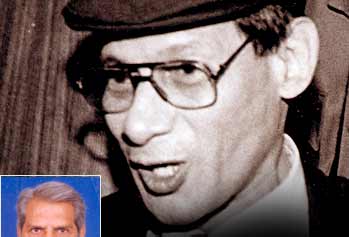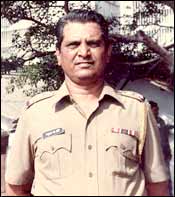

Charles Gurmukh Sobhraj escaped five times from jails in Afghanistan, France, Greece, Iran and India. But eventually he was tracked down and caught in Goa by Inspector Madhukar Zende of the Bombay police and lodged in Tihar jail where he spent a good part of 20 years as an undertrial.
On being freed from Tihar in 1997, Sobhraj went back to France for a while where he wrote a book on his life and authorized a film based on it, earning good money from the deals.
But somehow he could not stay put in France and returned to the subcontinent, to once again find himself behind bars, this time in Nepal, for a double murder committed 28 years ago. Sobhraj claims he is innocent.
 Zende, who retired as assistant commissioner of police, had the distinction of arresting Sobhraj twice, once in 1971 and again in 1986. He spoke to rediff.com about the man who was variously called The Serpent and Criminal of the Century:
Zende, who retired as assistant commissioner of police, had the distinction of arresting Sobhraj twice, once in 1971 and again in 1986. He spoke to rediff.com about the man who was variously called The Serpent and Criminal of the Century:
I always felt that Charles was a very money-minded man, a hardened criminal. But though he has earned a lot of money and does not want for anything, his desire for excitement will not let him be quiet. That is possibly why he has returned [to the subcontinent]. Crime is in his blood. He will never give it up.
Charles committed at least 32 murders, most of his victims were women, and he broke out from jail on at least five occasions, including twice from an Indian jail.
As I remember it, Charles had four very rich Parsi girl friends in Mumbai. I don't know why, but women used to fall for him. They were crazy about him. When he was in custody, his lawyer also fell in love with him. He seemed to have some charm that made the girls go crazy.
How is Charles able to get so many women friends after committing so many crimes? And why do people continue to fall for him? This will always remain a mystery to me. But this is the reason why he has become one of the world's more notorious criminals.
 | The Saga of Charles Sobhraj |  | |
|
I had first arrested Charles in 1971 in the Ashoka Hotel robbery case. We recovered rifles, revolvers and some other weapons from him. He used to bring these weapons from Afghanistan by the land route and sell them in India.
Officers from the Delhi police were also in Mumbai to arrest him. But we got the credit for his arrest. He was a wellknown criminal of the time, so as soon as we arrested him, several people began approaching us for custody. Eventually the Delhi police got his custody and took him to Delhi.
My second meeting with Charles was in a Delhi court where I had gone to give evidence against him.
Within 14 days of his arrest, Charles pretended to be suffering from appendicitis and got himself admitted to hospital. Those were the days of the Bangladesh war. During a blackout in Delhi, Charles escaped from hospital.
In 1975 I again got a tip-off that Charles was in the city and staying at a particular hotel. We raided that hotel. But unfortunately he escaped. We followed him, but could not get him.
We caught up with his Canadian girl friend, however. From her, we secured eight or 10 photographs of Charles done for different passports in different disguises. She also told us about so many murders he had committed, which she had seen. She was thankful to us for getting her out of his net.
Two years later, the Canadian government took her back.
Meanwhile, six months after he gave us the slip, Charles was caught by the Delhi police in a Delhi hotel. That was in 1976. From then on, he remained in custody till his escape on March 16, 1986.
In 1986 the railway police in Mumbai arrested one of Charles' associates. The Maharashtra DGP called me because when I had arrested Charles the first time I had got a lot of publicity and so everyone in the department knew me. The boss told me, 'We have something related to Charles Sobhraj for you.' Thus I got the case for investigation again.
 | Slide Show! |  | |
|
We got a lot of information from Charles' associate and then we arranged for our Goa trip to arrest Sobhraj again.
Just three weeks after his escape, my team caught up with him on April 6, 1986, in Goa.
When we arrested him, his reaction to me was: 'Now you will become a famous man and get lots of publicity.'
When I tried to tell him that what he was doing was not right, he told me to mind my own business. 'I know what to do,' was his attitude. He told me this country is a paradise for criminals. Thereafter he avoided talking to me.
We were bringing him back to Mumbai, but the crime branch took him into custody in Panvel (about 70 km from Mumbai) and from there they took him to Delhi.
We thus got to spend very little time with him. But during all that time we remained very much on the alert because we knew he was a martial arts expert and he would surely try to escape if he got half a chance.
Charles, however, had not committed any crime in Mumbai. We had arrested him on the request of the Delhi police.
After this, my fourth meeting with Charles was in the sessions court in Delhi where I had gone to give evidence against him.
He represented himself in court and cross-examined me. And he cross-examined me like a professional advocate, because he had studied law a lot. That was the last time I saw Charles Sobhraj.
The second time I arrested Charles, I again got a lot of compliments from India and abroad. My police department was proud of me.
When I had gone on a European tour last year, all my friends told me Charles is in Paris and I should try and contact him since I was going to stay for two days there. But I said he is a hardened criminal and I am a retired police officer and I have no business contacting such a man.
Design: Rahil Shaikh
Also Read: What is Charles Sobhraj up to?